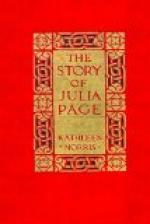“‘My God’s’ a bad word,” Anna said gravely to her father, “isn’t it, Mother?”
“I wouldn’t like to hear you say it,” Julia answered. “Now trot out to Aunt Regina, dear, and ask her to give you your lunch. Mother’ll be there immediately.
“She’s exquisite,” Jim said, when the child was gone. “You all over again, Ju!”
“She’s smarter than I was.” Julia smiled dispassionately. “I’ve taught her to read—simple things, of course; she writes a little, and does wonders with her numerical chart. She’s very cunning, she has an unusual little mind, and occasionally says something that proves she thinks!”
A silence followed. Sunshine was streaming into the sitting-room; nasturtiums bloomed in Julia’s window boxes; the net curtains fanned softly to and fro in the soft autumn air. In the city, a hundred whistles shrilled for noon.
“I hardly knew the place,” Jim said, searching for something to say. “You’ve made it over—the whole block looks better!”
“Gardens have come into fashion,” Julia explained; “the Mission is a wonderful place for gardens. And the change in my mother is more marked,” she went on, with perfunctory pleasantness; “you would hardly know her. She is much thinner, of course, but so bright and contented, and so brave!”
“I am going to meet her, I hope?” Jim suggested. Julia looked troubled.
“I hardly see how,” she said regretfully. “As things are I can’t exactly ask you to lunch, Jim. It would be most unnatural, and they—they look to me for a certain principle,” she went on. “They know what these four years have meant for me; I couldn’t begin now to treat the whole thing casually and cheerfully.”
“I don’t expect you to,” Jim said quickly. “I’m not taking this lightly. I only want to think the thing well over before any step is taken that we might regret.”
Again Julia answered him with only a tolerant, bright look. She stood up and busied herself with the potted fern that stood on the centre table, breaking off dead leaves and gathering them into the palm of her hand. Jim, feeling clumsy and helpless, stood up, too. And as he watched her, a sudden agony of admiration broke out in his heart. Her head was bent a little to one side, as if the weight of the glorious braids bowed it; her thick lashes hid her eyes; her sweet, firm mouth moved a little as she broke and straightened the fern. Where the wide collar of her checked gown was turned back at her throat, a triangle of her soft skin showed, as white and pure as the white of daisy petals; her firm young breast moved regularly under the fresh crisp gingham; the folds of her skirt were short enough to show her slender ankles and square-toed sensible low shoes tied with wide bows.
“You used not to be so cold, Julie,” Jim said, baffled and uncomfortable.
“I am not cold,” she answered mildly. “I never was a very demonstrative—never a very emotional person, I think. Three years ago—two years ago, even—I would have gone on my knees to you, Jim, begged you to come back, for Anna’s sake as well as my own. But that time has gone by. This life, I’ve come to see, is far better for Anna than any child in our old set leads, and for me— well, I’m happy. I never was so happy, or busy, or necessary, in my life, as I am now.”




